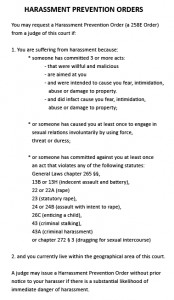Like many other states, Massachusetts has enacted legislation to allow people who allege they are, or will be, at risk for domestic violence or harassment to obtain court orders of protection.
There are two distinct types of available orders:
- Chapter 209A Abuse Prevention Order
- Chapter 258E Harassment Prevention Order
Each has specific purposes, procedures, and proof requirements. These orders are granted in civil rather than criminal proceedings. The case is filed by one person against another instead of by the district attorney.
If someone seeks either a Section 209A or a Section 258E order of protection against you, it is crucial that you consult immediately with an attorney. Experienced counsel can present a defense on your behalf and challenge whether the complainant has a valid case, whether he or she has met all of the requirements under law, and whether your constitutional rights have been protected.
Violation of An Abuse or Harassment Prevention Order
Once an order has been entered, you must obey each and every part of it. The court order, itself, will include a notice in bold letters informing you that a violation of the order is a criminal offense.
If you violate the order, you can be arrested, and the matter is turned over to the district attorney’s office and the criminal courts.
Of course, as with all criminal matters, the prosecution must prove beyond a reasonable doubt that you violated the court order. There will be a hearing at which your attorney can challenge the prosecution’s evidence, or assert that no violation occurred.
Penalties for Violating Abuse Prevention Order
Chapter 209A lists specific penalties for violation of an abuse prevention order. If you are found guilty of violating the order, you can face a fine of up to $5,000, or you may be sent to prison for up to 2-½ years. The judge may impose both a fine and a prison sentence. Instead of immediately incarcerating you, the judge can instead impose a no-contact rule and order you to wear a GPS tracking device.
The judge will also ordinarily make you attend and complete a certified batterer’s program. He or she cannot substitute a substance abuse or anger management treatment program for the batterer’s program. However, if you have a substance abuse problem, the judge can order you to undergo specific treatment for that too.
You may also be ordered to pay for the complainant’s damages including, for example, costs of emergency shelter, lost wages, personal injury, and property damage.
Penalties for Violating Harassment Prevention Order
Chapter 258E contains specific penalties for violation of a harassment prevention order issued under this statute.
If you are found guilty of violating this type of order, you can face a fine of up to $5,000 or a prison sentence of up to 2-½ years, or both. The judge may also order you to complete a treatment program tailored to your situation.
 Massachusetts Criminal Defense Attorney Blog
Massachusetts Criminal Defense Attorney Blog


